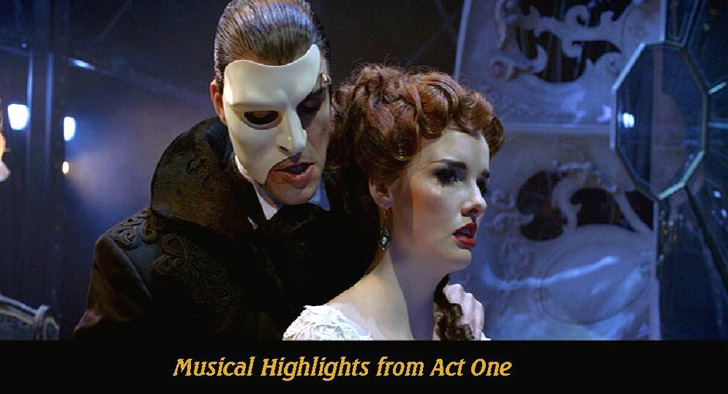Musical Highlights from Act One
If some of the songs in Love Never Dies (LND) sound somewhat familiar, it's really no surprise. A number of them, such as Beneath a Moonless Sky, were first heard instrumentally as incidental and background music in Webber's The Phantom of the Opera (2004). The original Phantom theme and other song bits in turn are used in kind in LND. Wreathing the two productions together in LND in such a careful fashion not only created a solid musical link, it also successfully avoided forming identical peas in a pod. The 2004 film and LND are more like two rosebuds on the same branch tip; petals overlap musically and resemble each other in silhouette, but each is resoundingly distinct within. Other brief reprises from 2004 used in the sequel include passages from Stranger Than You've Dreamt It, Twisted Every Way, Little Lotte (which Simon Gleeson sings as Raoul), Prima Donna, and a reworking of All I Ask of You, with Gleeson again singing, Just Ask It of Me, to Christine in her dressing room before going onstage to sing the title aria. And from that endpoint, we return to the beginning of Love Never Dies (2011)....
|
Home Page |
|
|
|
Spring 2014 |
|
|
|
|
Waves of time have passed, and intertitles fade into a shadowy blue world. Mist swathes about a railed pinnacle upon which sits an ornate organ and tufted bench. The Phantom seated at the keyboard, streamed in eerie light, sounds out four majestic chords on the organ, and then collapses fraught with emotion. The sudden piercing agony of his impetuous memories is overwhelming, and he buries his face in his arms. Only the thought of his song being sung one day by Christine inspires him to continue working on his new score in 'Til I Hear You Sing Again – the opening number of LND widely known to be a favourite of leading man and baritone, Ben Lewis. The singer's controlled grace and mastery in delivery conveys the excruciating torment the Phantom experienced during ten years of separation from “his Christine.” Lewis makes the song swell as a powerful poetic and sentimental leitmotif of devotion, underscored by the character's motivation and musical aspirations because of his obsession for one woman.
From hastily scribbling corrections, to frustratedly crumpling up and throwing down his creative blood and sweat on paper as not being good enough, Lewis' Phantom unabashedly wears his heart upon his sleeve. His longings and worship of Christine materialize before him – as a vision in a celestial cameo. Ghostly winds softly whisper of the past as he yearns for her to be with him, the lyrics lamenting “...I dream that you are there, but I wake holding nothing but the cold night air.” He misses her as a woman, longing for her to be by his side to sing for him “once more,” loving her as he does inseparably for herself and her talent.
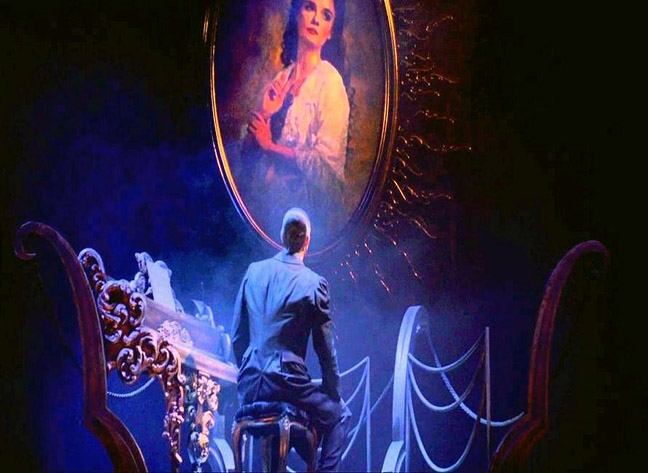
In the opening scene of Love Never Dies (2011), “....The day starts, the day ends” with the Phantom wishing Christine were there.
During this first number we are introduced to the symbolic gesture that betokens the overall romantic spirit of the sequel. The Phantom looks into his empty hands. To the naked eye, nothing is seen. Yet something resides there, which his heart sees indelibly when everything else is gone. This epithetic gesture of the Phantom's, used as well by Christine during the title aria later because she too knows and suddenly understands, exemplifies why he has carried on and survived the years without her. Only that intangible spell of love could remain faithfully and fervently between them and keep them together over such lengthy passages of time and distance.
Following the triumphant opening number, comes the surreal colour splashes of The Coney Island Waltz, featuring Gangle, Fleck, Squelch (Dean Vince, Emma J. Hawkins and lyric tenor, Paul Tabone) and the ensemble. They introduce Mr. Y's (the Phantom's) Phantasma, an amusement park home to circus performers as well as outcasts of society like Mr. Y. himself. All the gorgeous razzle dazzle bursts like fireworks beneath a circus canopy almost as tall as the three storey stage, topped by the platform where the Phantom sits reigning and watching over the excitement. Acts of all kinds – a dancing bear, a familiar looking monkey with cymbals on a wagon being towed by a giant tricycle, stiltwalkers, fire eaters and torch twirlers, and an elaborate fantasy carousel – share centre stage. But this is only the surface of the hula-palooza.
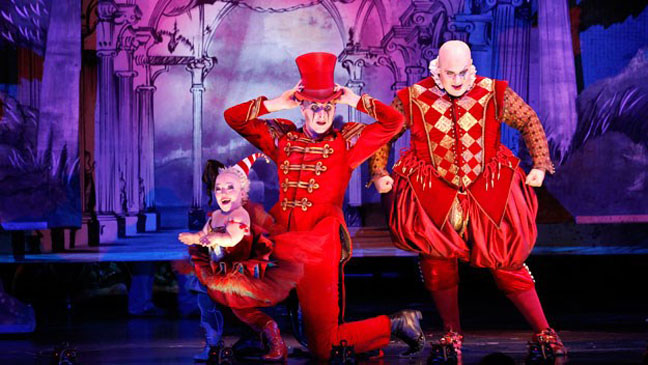
Master of Ceremonies Gangle, aerialist extraordinaire Fleck and Squelch the world's strongest man, welcome one and welcome all to the Phantom's Coney Island circus fayre known as Phantasma. (Photo: Jeff Busby)
Phantasma then offers up the rollicking Only for You, with Sharon Millerchip as Meg Giry the “Ooh-la-la Girl.” She's accompanied in the Follies-style dance by a troupe of songbirds in lavish feathered dance suits every colour of the rainbow, headdresses adorned with petite bird skulls. Millerchip exudes a sheer joy while performing.
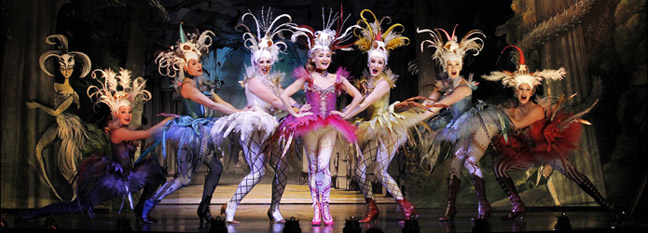
“Ooh-la-la Girl”, Meg Giry, played by Sharon Millerchip (centre, in bright pink costume) and the other Phantasma dance hall girls pose in a publicity photo. (Photo: Jeff Busby)
Her Meg character is likeable, and a little pitiable, as she's hoping that the Phantom will make her his empusa one day, and she girlishly infatuates to her mother, “I was suddenly aware of a presence in the air and I know it was him!” In the ensuing duet, Ten Long Years, Madame Giry (played by renowned actress-singer Maria Mercedes) forces daughter Meg out of her frivolous fantasies, reminding her how their beloved Phantom had found his way to the New World thanks to their efforts. Mercedes veritably embodies the stern churlish Madame Giry, coiffed and costumed as though she had just stepped out of the Leroux novel.
After being brought to the hotel suite by the automated carriage, Simon Gleeson as Raoul marvellously spits out all his impatience and disgust at how they've been treated in What a Dreadful Town! Upon Raoul being called away to a supposed meeting with Oscar Hammerstein, it is Christine's opportunity to help Gustave (played wonderfully by Jack Lyall) look past his “father's” brash and callous manner, asking her son in song to instead “Look with Your Heart” at him. Between the two songs, Christine's memories begin to stir, such as when Gustave plays a few phrases from the mysterious score that had been left on the piano before they had entered the hotel suite. Some of the lyrics speak of the despair of losing her past with the Phantom. Anna O'Byrne touchingly expresses her character's thoughts, with a transparent faraway look in her eyes as she sings softly, pausing on the last word: “Make sure you don't forget...love you misunderstand...is love that you'll regret.”
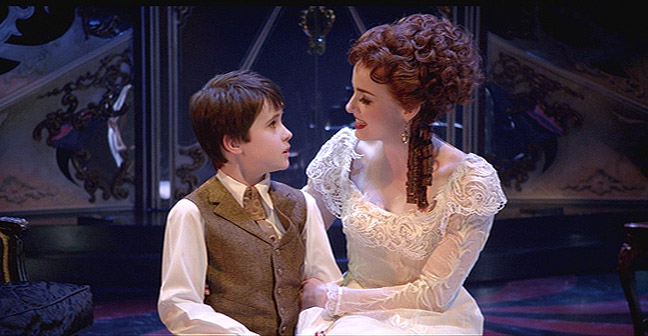
Christine, with a mother's heart, singing to son Gustave
With Gustave off to bed, it's not long before Christine grows uneasy at the escalating peculiarity within the suite. Earlier, her son's new toy had begun to play music without being turned on, and it began to again. Without warning, the room becomes saturated in midnight blue, and the balcony doors suddenly swing open as though ethereal hands had mystically parted them. The Phantom stands in the balcony doorway of Christine's hotel suite, and within moments he realizes he must pursue Christine again as relentlessly as he did ten years previously, if he is to win her back. His only choice is to remind her of the feelings they once had for each other. It's perceived that in his heart of hearts he still views Christine as his wife.
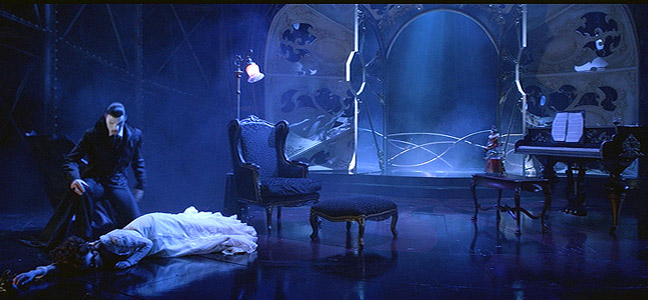
Christine faints upon seeing the Phantom again after ten years of thinking he was no more....
And her memories of their love and the shock of seeing him alive after thinking of him dead for ten years, rush in on her and cause her to faint. The early part of the scene is much like a wedding ceremony – to the point that the Phantom is in an elegant evening coat and Christine Daaé in an exquisite ivory dress that could easily be a wedding gown. Like any groom, he picks her up into his arms, to cross the fantasy threshold, perhaps in his mind he is remembering picking her up into his arms long ago. And so begins the Beneath a Moonless Sky grand love duet, filling the viewer in on their past and their one secret night of abandonment of soul and body to each other.
Ten years earlier, Christine had been forced to hide away her love for him, and accept her fate as a dutiful wife to Raoul and mother to her son. For Christine, too, it had been ten long years, living with the knowledge in her heart about Gustave that had never been disclosed to the Phantom. During the duet it is revealed that it was Christine who sought out the Phantom where he hid. The lyrics soon become a sung memory of their dalliance, as well as a veiled sexual foreplay that invites them to forget pretenses and again let the world fall away so that only their love would be their inseparable reality. Would they dare to give themselves to each other again? On that moonless night ten years earlier, they could not resist each other and they had made love three times, resulting in their son Gustave being conceived.
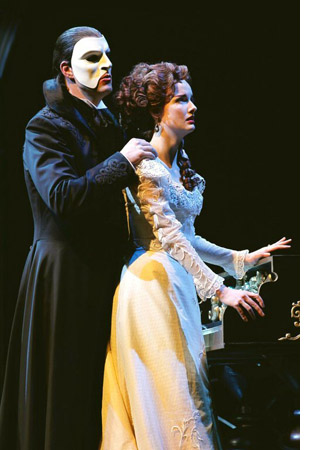
Production still of Ben Lewis and Anna O'Byrne just as they're about to begin the grand love duet. (Photo: Jeff Busby)
What Leroux could only suggest in his novel is now allowed to be put forth bluntly – that the same Phantom who once wrote the lurid Don Juan Triumphant opera, and declared that he had had many women, also possessed a sexual prowess he had undeniably proven with Christine. There is now no question that the Phantom wants her back in every way. “And now?” he sings, hopeful that they could resume their relationship then and there in the setting of the hotel suite that could easily have become their boudoir.
Speaking of “And now?” the duet had reached a feverish plateau twice, they had sung to each other in close comfort, reliving their most romantic moments of the past singing with their lips at times almost touching throughout the scene – and the audience is led to expect a kiss. And what kind of kiss? One that could have been similar to the impulsive unbridled kiss Lily Bart (Gillian Anderson) and Lawrence Selden (Eric Stolz) shared in The House of Mirth (2000) – and which would have reminded the Phantom and Christine (and viewers) without question of the love they had once delighted in. Then the “And now?” might have carried even more meaning for poor Christine, who had enough distraught emotion already welling in her features. But wise to have it so, without a kiss, with so much more of the story to unfold.
A number of almost hidden subliminal gestures made by the Phantom prior to and during the duet add a provocativeness to a melody already laden with allusions to their lovemaking. Regarding graphic content, a barely perceptible caress of her bodice while Christine is in a faint (and a more noticeable one later in the sequence) is not entirely out of character for post-Victorian novels, and later on in film. Early cinema had varying degrees of nudity as well, allowed until the Hayes Code went into full effect over 1933 and 1934. In the silent and most successful film of 1921, The Four Horsemen of the Apocalypse, Rudolph Valentino as Julio Desnoyers is shown painting nudes on-screen. Another scene allows an embrace and full caress of Alice Terry's bosom by Valentino while kissing, without “time limits” yet enforced. (All done in good taste then, in direct contrast to much of the overt and often repellent sexuality found in cinema today.) Other subliminal suggestions in LND also occur, but viewers will be well able to pick up on all the subtle sexual symbolism going on.
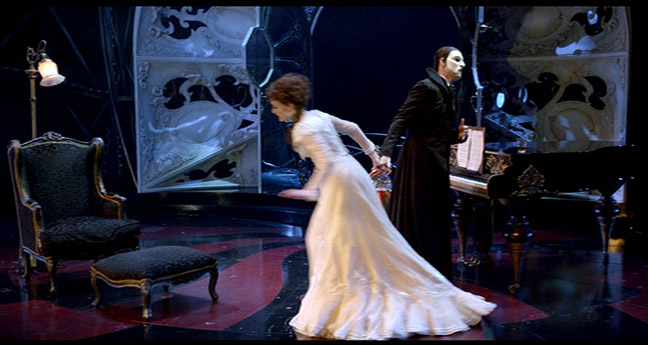
For Christine and the Phantom, so many thoughts, perhaps much love, in a touch of fingertips
In a more true to romance sense, one lingering handclasp just as Christine flees to the footstool shows the perfect emoting through body language and timing Ben Lewis possesses as an actor; how can there be so much pent-up yearning and adoration expressed in that one infinitesimal gesture of a last held-onto moment of fingertips touching? Close embraces and the Phantom's enthralled, unwavering and purposed gaze (with a tensed bottom lip) at Christine during the last part of the duet all further serve to make it easy to accept that they were once, and would evermore be, devoted intimately and in psyche to each other. These more passionate moments from the play and film may well have already served to make a sex symbol out of Lewis, in the same way most other actors playing Dracula or similar “creature of the night” characters have experienced.
Throughout the Leroux novel, emotion-filled and sensually gushing words promenade back and forth – “raptures,” “rhapsodies,” “ecstasies” – such flights of feelings infuse LND and particularly emerge in this duet when Christine is upon the footstool with the Phantom kneeling at it first, then slightly upon it, and holding her at her waist. The “rapturous” moments (remembered from long ago and now experienced anew again) increase in poignant intensity after he draws her up to stand in a tight embrace and they become completely oblivious to everything but their closeness. As he takes a few steps forward, he is stepping back in time in his memory as he recalls pursuing and catching her – and Christine responds with her own passionate memories of that “long ago night” – all of which are enhanced by the spectacular camera work that leaves the viewer wondering if Anna and Ben were moving or was it only the camera...?
On youtube:
Christine and the Phantom, reliving stolen moments in the grand love duet, Beneath a Moonless Sky
During the earlier process of getting LND stage-ready as musical theatre, the orchestra and cast members got things down pat separately instrumentally and vocally, and then the time came to do the “sitzprobe” – a first or early rehearsal together of orchestra and cast, with no costumes and without acting, to “work out the marriage.” Anna O'Byrne and Ben Lewis were filmed in the sitzprobe in their everyday clothes and without performance gestures for Beneath a Moonless Sky. An undeniable energy and magic between them existed even then. Ben appeared to sing most of his lyrics with eyes closed, and both he and Anna sang with as much passion and emotional vocal inflection as they would have during an actual performance on stage in the future. (A youtube video exists for this sitzprobe as well.)
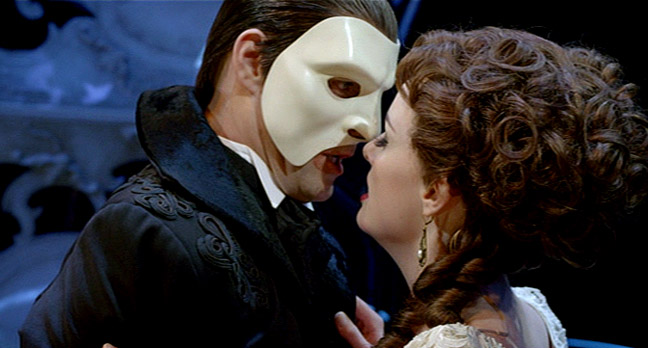
The Phantom and Christine lost to their love of years ago
Reminisced in the duet, the Phantom leaves at the time of morning when it is still dark but birdsong has begun (mimicked by the tremolo of a flute). He sings the lines “ashamed of what I was; afraid to see your eyes,” suggesting that either he still felt insecure about his disfigurement and didn't want Christine to see him in the daylight, or that he was worried he'd been too forceful with her during their night of love, as when singing those lyrics he slightly parted his eveningcoat at his waist. In the final minutes of the duet, Christine's true feelings are confessed when she sings that she was going to tell the Phantom that she loved him, but she had “found you gone instead.” He implores her anew then, that he would love her until he died, but all to no avail. As she says with finality, “There is no now....”
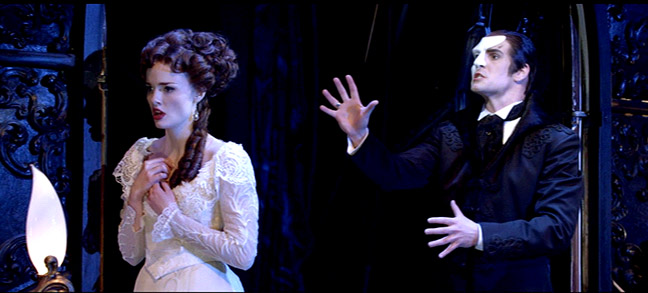
The Phantom longs for her to sing for him again, as he sings to her, “When that miracle, that peerless instrument, plays for me....”
The stage revolves to have the balcony face the audience, and Ben and Anna flow into the beautiful duet Once Upon Another Time," tenderly singing of missed chances and turning pages and regretting choices made. Ten Long Years of Yearning follows, with the Phantom still desiring to have her sing one more time for him, in his concert hall, at this point accepting that nothing else would be resumed between them. He is indignant, however, at her reply “I owe you nothing.”
And then his trump card appears on the balcony – Gustave, awoken by a nightmare. As soon as Gustave begins to sing Mother Please, I'm Scared! something stirs faintly within the Phantom. The audience can make one guess as to what the latent feeling is behind the expression. At this point, only Christine knows exactly the true identity of Gustave's father. The Phantom invites Gustave to his Coney Island amusement park, Phantasma, and will personally give him a tour.
After returning inside the suite with Gustave sent off to sleep, the Phantom seized his best opportunity in a way that gallant manners could not. If only to “hear her sing once more” and perhaps along the way restore their relationship through their long history of music, he shoots the arrow at her heart, suggesting the possibility that Gustave might disappear on Coney Island if she does not sing for him. Ignoring the pulls at her own heart, ignoring her true feelings for the Phantom, she chooses convention to keep her marriage to Raoul and her family from disgrace, and she is outraged that the Phantom would coerce her to sing by warning that their son would be endangered. When he continues to threaten her, she relents to sing for him one last time. And then, as mentioned in the Their Christine – Anna O'Byrne article, when she later opens the score, her heart is wrenched and then drowned with the realization of how much she still loved the Phantom and would do anything for him.
Part of Christine's love for this “glorious creature” (as Lewis' personification of the Phantom has been referred to by one blogger) lay in the creative bond between them. He brought out her best as her muse, The Angel of Music. He gave her direction. He gave her undeniable love. When he asked her in the novel to sing for him, and for him only, she did, most paradisaically. Raoul witnessed it, as did Madame Giry and the opera house managers. In turn, when she sang like the angels, the Phantom was profoundly affected. The creative bond can in some ways be stronger and more enduring than physical aspects of a relationship; yet it can also be said that such a creative bond will strengthen and enhance a relationship in every way imaginable. Creativity is a force that is never finished, it is never closed off, it is always inspired, always seeking, always finding what is “beyond.” And when mutual, it is like two candles placed side by side with wicks almost touching. Light one, and the other will also soon glow from the same flame, increasing that flame in brightness, uniqueness and intensity.
As was related in the novel, Christine could only sing well when the Phantom was seated in the opera house's grand tier Box 5. When Raoul decided to sit in that box for a performance, Christine was unable to give her best onstage to a song. If others also sat in that box? Beware!
So, Christine had become the Phantom's captive talent and at the same time fulfilled him, and made his dreams for art and beauty real to him. As she was his living dream come true, loving her became as important as being her mentor and teacher. And in a magic way, the love and talent became an inseparable force and attraction between them. Slowly, in the novel and most films, Christine blossomed as a singer under his guidance, and her love (often confusedly) grew for him correspondingly. Soon this magic began a process in the Phantom that would culminate in transforming the sinister mark of the mask he wore into a mask shielding a mortal and ordinary man whose heart had been touched and changed by love. He had been originally besotted with Christine as an unobtainable woman, whom he was ashamed to love because of his own deformity. But then, when he knew she was attainable and could potentially love him as completely as he did her, their bond in LND for that briefest time after Christine performed the title song transformed into something wondrous and eternal.
Dear Old Friend – This song for quartet is a prime example of double entendre on the part of the Girys, who “welcome” Christine and Raoul to Coney Island. And while Meg is unnerved to discover that Christine is to sing the aria in the Phantom's concert Hall, Raoul is finding out that Christine's contract was bought out by “him” – the Phantom – for whom she “must sing.” Nothing of their relationships is exactly as it was in the 2004 film. All concerned have either grown up, or grown apart, or grown envious and jealous. The song also served as a diversion for Gustave to disappear....
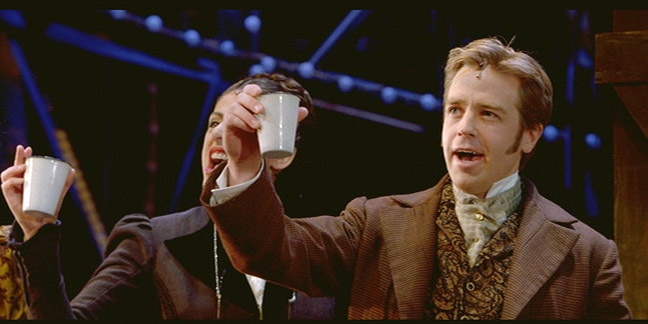
Maria Mercedes and Simon Gleeson raise their glasses in a toast to their old friendship
Beautiful and The Beauty Underneath – The Phantom and Gustave
Gustave, accompanied by Fleck, Gangle and Squelch, descends beneath Phantasma into its darker, more hidden reaches. With the Phantom as his “tour guide” Gustave is introduced to the rejected of society who are displayed within illuminated tall pyramid-like mirrored glass cases, like precious gemstones in velvet lined jewellery boxes. The lyrics pulse with a fascination for things the sunlit world would consider dark and strange. The Phantom had grown up in a sideshow world of cruelty without genuine affection and because no one saw his “inner beauty – the beauty underneath” he did not really live, and existed as an object of ridicule. Nothing in his world really had any meaning or gave him purpose to live except for his slowly acquired talents. So the world he later created on Coney Island and beneath it was filled with all things he saw as beautiful in his own eyes. A few isolated mentions on phan pages or tumblrs, however, have referred to The Beauty Underneath sequence as the “stranger danger” scene, and unjustifiably, for the Phantom already was strongly suspecting that Gustave was his son, and like any good father, was essentially taking his child on a walk through an amusement park.
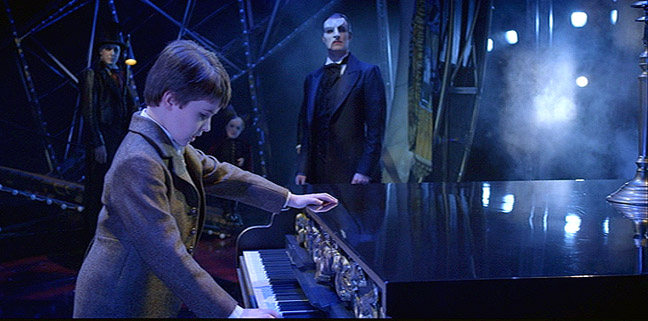
Gustave at the piano in Phantasma's underworld with the Phantom looking on
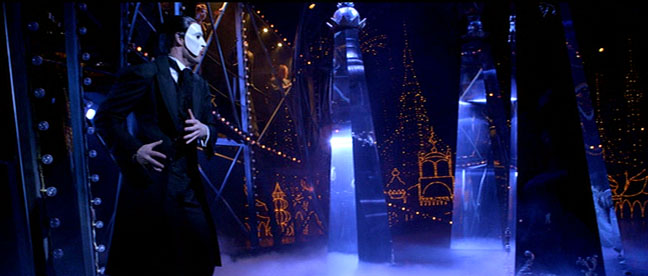
The Phantom, during The Beauty Underneath sequence
“How did you think I wouldn't know?” he asks in The Phantom Confronts Christine. It's a magnificent scene which restores hope to the Phantom. Although Christine has not admitted to loving him, she has told him that Gustave is his son and that she will sing for him one last time. Anna shows great skill as Christine extending the utmost tenderness toward the Phantom, sensitively comforting him without pitying him. And although the Phantom had all along suspected that Gustave was his son, he is nonetheless shocked to hear the revelation finally from Christine's own lips.
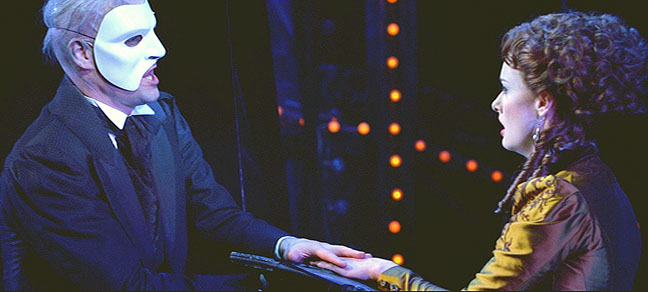
Once more....
In one of the most gripping scenes of the film, with the Phantom knowing Gustave is his own son, and Christine agreeing to perform his new score, new hope and new life wellspring within him. Lewis fiercely takes hold, and gives everything within himself to his sung soliloquy after Christine has departed the scene, to present the Phantom's every surging feeling, dream and inner resolve in another new world he finds himself in – fatherhood. The Phantom's life could only be more complete if Christine could be at his side. It is another moment of proof that he truly felt human in every sense of the word, having purpose and meaning, with everything falling into place and having a wholeness of perspective. Even if he had lost Christine's love per sae, he would still have it in essence through their son, and he commits his life to the future success of Gustave. All the years of suffering seem to vanish, and he wanders about in a dazed happiness and soon disappears into the thickening mist among the now-dark pyramids of his Phantasma.
It is then that Madame Giry suddenly emerges from a smaller glass pyramid, and in an incredible performance, Maria Mercedes shakes Phantasma's underworld with a darkly shrill and menacing version of Ten Long Years. Formidable moreso than Raoul as an adversary to the Phantom, Giry knew and understood the Phantom's weakness for Christine, and was fully aware of the obvious threat that Gustave was now to herself and daughter Meg.
Act One of Love Never Dies could not end on a more chilling note....
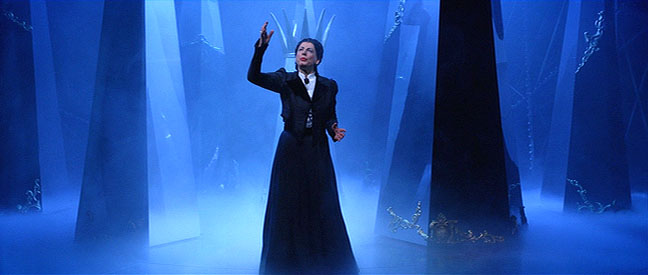
Ending Act I, Maria Mercedes as the once loyal Madame Giry in her foreboding solo....
|top|
